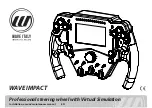
4-46
During a momentary power failure, the motor slows down. After power is restored, the inverter restarts at the
frequency just prior to power failure. Then, the current limiting function works and the output frequency of the
inverter automatically decreases. When the output frequency matches the motor speed, the motor accelerates up
to the output frequency. See the figure below. (In this case, the instantaneous overcurrent limiting must be
enabled (H12 = 1)).
• Auto-restarting after momentary power failure
IPF
This output signal is ON during the period after the occurrence of momentary power failure until the completion of
restart (the output has reached the reference frequency). Beware that when the
IPF
is ON, the motor slows down.
(
For details about
IPF
, refer to E20 through E24 and E27 (data = 6).)
Restart mode after momentary power failure (Basic operation with auto search enabled)
Auto search for idling motor speed fails if it is done while the motor retains residual voltage. It is therefore
necessary to leave sufficient time for the motor (auto search delay time) to discharge the residual voltage. The
delay time is specified by H46 (Starting Mode (Auto search delay time 2)).
The inverter will not start unless the time specified by H46 has elapsed, even if the starting conditions are satisfied.
(
For details, refer to H09 and d67.)
• To use auto search for idling motor speed, it is necessary to have tuned the inverter.
• When the estimated speed exceeds the maximum frequency or the upper limit frequency, the inverter
disables auto search and starts running the motor at that frequency.
• During auto search, if an overcurrent or overvoltage trip occurs, the inverter restarts the suspended
auto search.
• Perform auto search at 60 Hz or below.
• Note that auto search may not fully provide the performance depending on load conditions, motor
parameters, wiring length, and other external factors.
• Do not execute motor tuning with output filter unless the filter is a reactor type only. A tuning error may
result otherwise.
















































